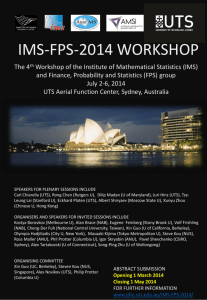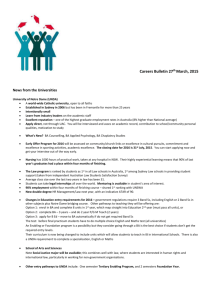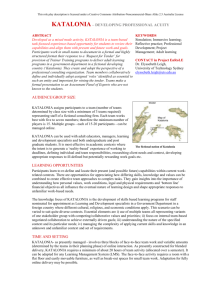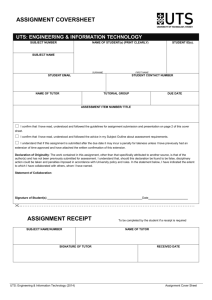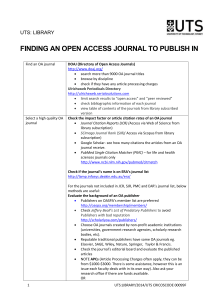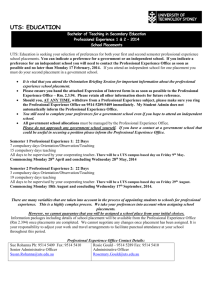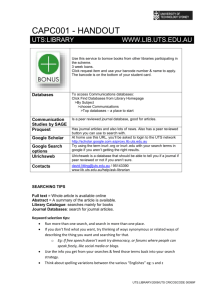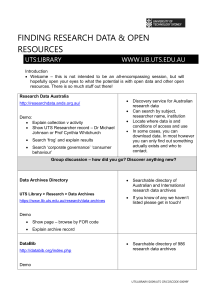70417 CORPORATE LAW 2009 AUTUMN
advertisement
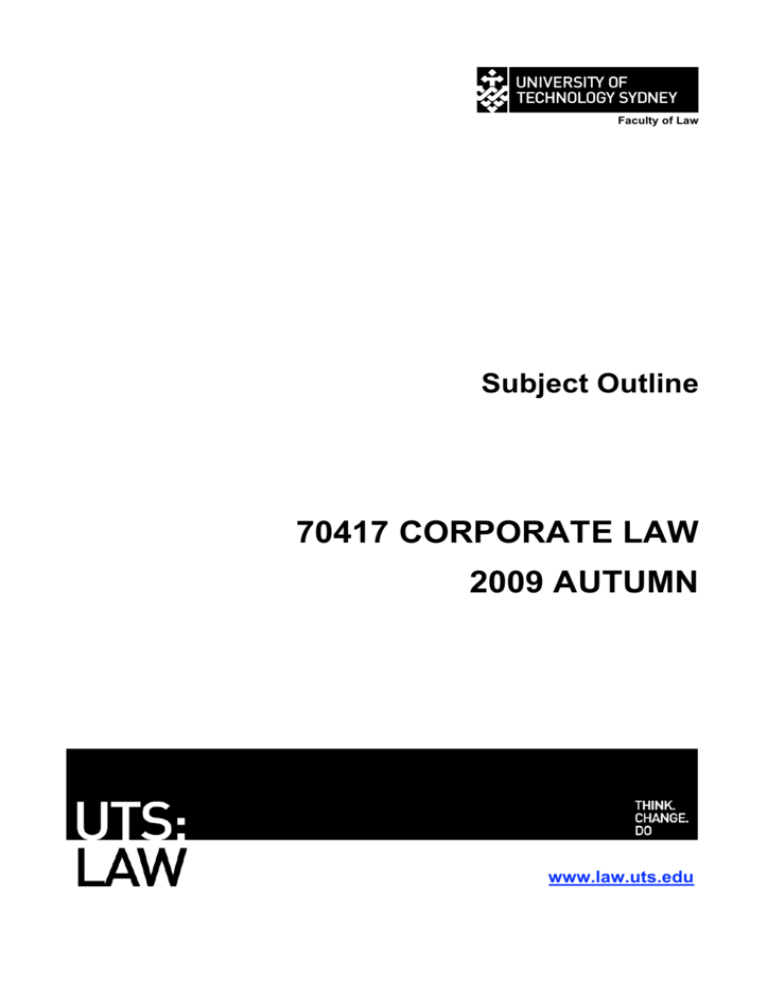
Faculty of Law Subject Outline 70417 CORPORATE LAW 2009 AUTUMN www.law.uts.edu .au SUBJECT OUTLINE UTS:LAW CONTENTS 1. Subject Details 2. Teaching Staff 3. Subject Content 4. Lecture Timetable 5. Texts and Materials 6. Teaching and Learning 7. Assessment and Exams 8. Guide to Assessments 9. Resources 10. Rules, Key Dates and Web References NOTICE: Students must regularly check UTS Online for any changes to the following course material and for announcements throughout the session. 2009 AUTUMN 70417 CORPORATE LAW UTS CRICOS Provider No: 00099F Page 2 of 32 SUBJECT OUTLINE UTS:LAW 1. SUBJECT DETAILS 1.1 Subject Name : Corporate Law 1.2 Subject Number: 70417 1.3 Semester / Year: Autumn 2009 1.4 Faculty : Law 1.5 Credit Points : 8 1.6 Level : Undergraduate and postgraduate 1.7 Requisite(s) : 70317 1.8 Subject Description Real Property Corporations are an all-pervading presence in contemporary society. An understanding of corporate law is essential for students intending to enter a commercial legal practice or aspiring to a senior appointment within a company. Awareness of the different rights and responsibilities of corporate stakeholders, such as directors, employees, creditors and shareholders, is also important for any prospective lawyer, since so many legal issues involve one or more corporations as parties to the action or transaction. This subject is an introduction to the field of corporate law and corporations, and their role in commerce and society. It looks at that mode of business activity conducted in the form of a vehicle known as a company or a corporation and asks 'What/why/how/who is it?'. It looks at the various actors involved, shareholders, directors, creditors, regulators and the public, and the web of relationships between these parties. It also looks at the legal system and laws, corporate laws, and how they provide dispute resolution mechanisms. In addition, the increasing role of laws as regulatory and prescriptive is explored with a tilt towards understanding and utilising theoretical models of the body corporate and public policies. This subject is taught from a student-centred perspective, with an emphasis on case and policy analysis, which may involve lectures, seminars and online exercises. It is Australianlaws focused and cases chosen for readings and discussion reflect this bias. 2009 AUTUMN 70417 CORPORATE LAW UTS CRICOS Provider No: 00099F Page 3 of 32 SUBJECT OUTLINE UTS:LAW 2. TEACHING STAFF It is highly recommended that email be the first point of contact with teaching staff. You should direct your emails to your Lecturer or Tutorial Leader in the first instance. 2.1 2.2 Subject Coordinator Name : Jason Harris Position : Lecturer Faculty : UTS Faculty of Law Room : CM05B.4.11 Campus : Haymarket Email : Jason.Harris@uts.edu.au Phone : (02) 9514 3772 Fax : (02) 9514 3400 Teaching Staff Name : Angus Corbett Position : Associate Professor Faculty : UTS Faculty of Law Room : CM05B.02.05 Campus : Haymarket Email : Angus.Corbett@uts.edu.au Phone : TBA Fax : (02) 9514 3400 Name : Sophie Riley Position : Lecturer Faculty : UTS Faculty of Law Room : CM05B.02.20D Campus : Haymarket Email : Sophie.Riley@uts.edu.au Phone : (02) 9514 3105 Fax : (02) 9514 3400 2009 AUTUMN 70417 CORPORATE LAW UTS CRICOS Provider No: 00099F Page 4 of 32 SUBJECT OUTLINE UTS:LAW Name : Colin Hawes Position : Senior Lecturer Faculty : UTS Faculty of Law Room : CM05B.4.06 Campus : Haymarket Email : Colin.Hawes@uts.edu.au Phone : (02) 9514 3730 Fax : (02) 9514 3400 Name : Lesley Hitchens Position : Professor Faculty : UTS Faculty of Law Room : CM05B.02.20B Campus : Haymarket Email : Lesley.Hitchens@uts.edu.au Phone : (02) 9514 3694 Fax : (02) 9514 3400 3. SUBJECT CONTENT This subject introduces the core doctrines of company (or corporate) law (the terms company and corporation will be used interchangeably except where the distinction between them is relevant). It also introduces doctrines of partnership law, one of the foundation stones of Australian company law. These topics will build on students’ prior studies of contract, property, tort and agency law as well as the law of fiduciary duties. The subject contains the company law topics required for an accredited law degree. These topics are the basic ones common to all company types. Issues specific to stock exchange listed companies are not covered in any depth in this subject but are treated in the subject 77901 Securities Markets Law. These excluded topics include the regulation of securities markets, corporate fundraising and company takeovers and some specialist topics in equity finance. An overview of corporate insolvency is also provided, with a more detailed treatment given in the subject 76115 Insolvency. In teaching this subject, we seek to balance the needs of those who wish to specialise in this area of law and those whose interest is less central to their career plans and intellectual interests. We hope to engage and expand your intellectual interest in the subject but without seeking to interfere with your career plans: the planet does not necessarily need more corporate lawyers. It does, however, need more people who understand and apply the principles, goals and techniques of corporate law and who are sensitive to the important legal, social and moral questions that the corporation peculiarly poses for all of us. In seeking to achieve this aim, we provide and apply distinct theoretical frameworks to the principles of corporate law. Students will critically assess corporate law principles by applying these theoretical positions to real life commercial problems. 2009 AUTUMN 70417 CORPORATE LAW UTS CRICOS Provider No: 00099F Page 5 of 32 SUBJECT OUTLINE UTS:LAW This subject comprises the following distinct components or themes. TOPIC 1-PARTNERSHIPS The subject commences with an examination of the principal characteristics of the partnership form of business association. The partnership is important in its own right — it is the most common form of business association — but also because it is the business form from which the principal characteristics of the English and Australian registered company are drawn. Some other forms of unincorporated association, pursued for business or for non-profit goals, are also briefly introduced. TOPIC 2-CONTEXTUAL AND THEORETICAL ISSUES The subject then turns to the idea of a corporation and of the role for corporate law. It commences with a basic sketch of some corporate law issues, offering an introductory insight into the history and derivation of the modern corporation, identifies some of the corporate stakeholders, and looks at the structure of the Corporations Act, some of the justificatory theories behind the design of corporate law, and some critical approaches to the analysis of corporate law. As the subject progresses, and your familiarity with corporate law doctrine and theory grows, this model becomes more sophisticated in design and application. This part of the subject allows us to focus further on some of the key stakeholders in a company, especially those people who decide to set up, invest in, deal with and eventually close down a company. Obvious stakeholders include shareholders and directors; others include creditors, employees, suppliers to the company and the wider community on which it depends for non-financial inputs. We will use different (sometimes competing) theories of corporate law to assess the basic question of the separation of ownership and control that exists within many corporations (particularly large public corporations). This theme also includes an introduction to corporate insolvency law. Apart from providing a general introduction to insolvency law processes, this class examines the challenges posed to traditional notions of corporate law that arise when the company is unable to pay all of its debts. TOPIC 3-CORPORATE EXISTENCE-CHARACTERISTICS AND CONSEQUENCES The third part of the subject examines the separate personality (or persona/identity) ascribed to the corporation and its independence from that of the various stakeholders or other actors in the corporate enterprise. In addition to the concept of corporate personality, we explore when that personality is treated as a facade and an apparently corporate act is regarded as an act of one of the corporate stakeholders (this process is known as lifting or piercing the corporate veil). This topic also requires us to re-examine the scope of the legal protection investors rely upon when they invest in a corporation through the doctrine of limited liability. A further aspect of corporate personality concerns how doctrines of legal liability are applied to this fictitious legal person. We pose basic (but fundamental) questions: how does a corporation, being an artificial entity, act? How does is sign documents and incur liability? 2009 AUTUMN 70417 CORPORATE LAW UTS CRICOS Provider No: 00099F Page 6 of 32 SUBJECT OUTLINE UTS:LAW TOPIC 4-CORPORATE DECISION-MAKING This theme builds on Topic 3 and explores in detail how the power to make particular decisions is allocated between participants in the corporation (principally, the board of directors and the shareholders as a collective group) and the degree of independence each group enjoys with respect to the exercise of their particular powers. This topic raises difficult questions concerning the apparent agency relationship between shareholders (as owners of capital) and directors/executives (as managers of that capital). The important role played by the corporate constitution in dividing powers between the different corporate organs will be examined in detail. TOPIC 5-CORPORATE GOVERNANCE The allocation and exercise of corporate decision-making powers is but part of the wider topic of corporate governance at least in that term’s description of the processes by which a company is directed and controlled. The final and most substantial theme of the subject deals with two other topics in corporate governance: the duties and liabilities imposed on directors and senior managers and the protection of minority shareholders. At the centre of this subject is the idea of the corporation and the role and shape of corporate law and regulation. Is the corporation best understood as simply a series of contracts between those who have an economic interest in it? Is the role of the law simply to provide default contractual protections to serve the interests of the providers of capital? Or does it have an entity or institutional status that is independent of those interests which asserts a claim to attention in its own right? Put another way, is the corporation a predominantly private association subject to regulation on the same basis as natural persons or has it assumed a role or significance in its larger public formations that changes the way we should view its purposes, character and regulation? What is the measure, or content, of corporate purpose and responsibility? Is it to maximise shareholder wealth with the only limit that set by the general legal system? Do the answers to these questions change when we shift the focus from the nation state to the international dimension of corporate activity? These are some of the important questions that underlie this subject. They are the haunting music that you will hear in the background of this subject and sometimes explicitly as its central themes. 2009 AUTUMN 70417 CORPORATE LAW UTS CRICOS Provider No: 00099F Page 7 of 32 SUBJECT OUTLINE UTS:LAW 4. LECTURE AND TUTORIAL TIMETABLE 4.1 LECTURE Timetable Week DATE 1. 23/02/2009 PARTNERSHIPS Jason Harris 02/03/2009 CONTEXTUAL AND THEORETICAL ISSUES •What is corporate law? •How are corporations regulated? •Corporate theory •Shareholder primacy Jason Harris 09/03/2009 CONTEXTUAL AND THEORETICAL ISSUES •Corporate insolvency •Consequences of insolvency •Duties upon insolvency Jason Harris 16/03/2009 CORPORATE EXISTENCECHARACTERISTICS AND CONSEQUENCES •Corporate veil •Veil piercing Colin Hawes 2. 3. 4. Lecture Topic Staff CORPORATE EXISTENCECHARACTERISTICS AND CONSEQUENCES 5. 23/03/2009 •Liability in contract •Liability in tort •Criminal liability •Agency principles Colin Hawes 30/03/2009 CORPORATE DECISION-MAKING •Allocation of power between corporate organs •The role of the corporate constitution •Altering the corporate constitution Colin Hawes 7. 06/04/2009 CORPORATE DECISION-MAKING •The role of meetings •Types of company meetings •Holding company meetings •Defects in company meetings Sophie Riley 8. 13/04/2009 Faculty non-teaching week-including mid-session exam 20/04/2009 Mid-semester non-teaching week 27/04/2009 CORPORATE GOVERNANCE •Officers and directors •Appointment and removal •Liability and enforcement •Insurance and indemnification 6. 9. 2009 AUTUMN 70417 CORPORATE LAW UTS CRICOS Provider No: 00099F Sophie Riley Page 8 of 32 SUBJECT OUTLINE UTS:LAW 04/05/2009 CORPORATE GOVERNANCE •The role of directors’ duties •Duty of care and diligence •The business judgment rule TBA 11/05/2009 CORPORATE GOVERNANCE •Good faith (bona fide) •Proper purposes •Best interests of the company Angus Corbett 12. 18/05/2009 CORPORATE GOVERNANCE •Conflicts of interest •Secret profits •Related party transactions Angus Corbett 13. 25/05/2009 CORPORATE GOVERNANCE •Members’ rights and remedies Angus Corbett 14. 01/06/2009 CORPORATE GOVERNANCE •Corporate groups Angus Corbett 10. 11. 2009 AUTUMN 70417 CORPORATE LAW UTS CRICOS Provider No: 00099F Page 9 of 32 SUBJECT OUTLINE UTS:LAW 4.2 LECTURE Reading List WEEK 1: (week beginning 23/02/2009) Lecture Topic PARTNERSHIPS Prescribed Reading Redmond Ch 1, [3.10]-[3.60], [3.80]-[3.140] Recommended Reading Partnership Act 1892 (NSW) WEEK 2: (week beginning 02/03/2009) Lecture Topic CONTEXTUAL AND THEORETICAL ISSUES Prescribed Reading Redmond [2.110]-[2.245] Supplementary reading 1 Recommended Reading Redmond [2.05]-[2.105] Supplementary reading 2 Supplementary reading 3 WEEK 3: (week beginning 09/03/2009) Lecture Topic CONTEXTUAL AND THEORETICAL ISSUES Prescribed Reading Redmond [3.185]-[3.215] Redmond [7.135]-[7.210] (liability for insolvent trading) Recommended Reading Finch V, ‘Visions of corporate insolvency law’ from Corporate Insolvency Law (2002, Cambridge University Press) ASIC Insolvency Information Sheets: http://www.asic.gov.au/asic/ASIC.NSF/byHeadline/Information%20for%20cr editors WEEK 4: (week beginning 16/03/2009) Lecture Topic CORPORATE EXISTENCE-CHARACTERISTICS AND CONSEQUENCES Prescribed Reading Redmond [3.70]-[3.75] (incorporation), [4.05]-[4.70] (corporate veil and limited liability) Recommended Reading Harris J, Lifting the corporate veil on the basis of an implied agency: A reevaluation of Smith, Stone and Knight (2005) 23 Company and Securities Law Journal 7-27 Moore M, A temple build on faulty foundations: piercing the corporate veil and the legacy of Salomon v Salomon [2006] Journal of Business Law 180 Ramsay M and Noakes B, Piercing the Corporate Veil in Australia (2001) 19 Company and Securities Law Journal 250 Watson S, Who hides behind the corporate veil? Finding a way out of the legal quagmire (2002) 20 Company and Securities Law Journal 198 ACN 007 528 207 Pty Ltd (in liq) v Bird Cameron (2005) 54 ACSR 505; [2005] SASC 204 BG Preeco I (Pacific Coast) Ltd v Bon Street Holdings Ltd (1989) 60 DLR (4th) 30 (Canadian case) 2009 AUTUMN 70417 CORPORATE LAW UTS CRICOS Provider No: 00099F Page 10 of 32 SUBJECT OUTLINE UTS:LAW WEEK 5: (week beginning 23/03/2009) Lecture Topic CORPORATE EXISTENCE-CHARACTERISTICS AND CONSEQUENCES Prescribed Reading Redmond [4.130]-[4.185] (criminal liability), [5.310]-[5.375] (contractual and tort liability based on agency principles) Recommended Reading Corporations and Markets Advisory Committee, Personal Liability for Corporate Fault (2006) www.camac.gov.au Chapple L and Lipton P, Corporate Authority and Dealings With Officers and Agents (2002, Melbourne University Centre for Corporate Law and Securities Regulation) Cooke R, Corporate Identity (1998) 16 Company and Securities Law Journal 160 Hargovan A, Fashioning the Rules of Attribution for Corporate (2006) 24 Company and Securities Law Journal 388 Krawitz A, Protecting outsiders to corporate contracts in Australia (2002) 9 E LAW (Murdoch University Electronic Journal of Law) 1 WEEK 6: (week beginning 30/03/2009) Lecture Topic CORATE DECISION-MAKING Prescribed Reading Redmond [3.145] (constitution) Redmond [8.115]-[8.120] (constitution) Redmond [8.15]-[8.65] (limitations on power to change the constitution) Redmond [5.95]-5.190] (allocation of power between corporate organs) Recommended Reading Bundaberg Sugar Ltd v Isis Central Sugar Mill Co Ltd (2006) 62 ACSR 502; [2006] QSC 358 Capricornia Credit Union Ltd v ASIC (2007) 62 ACSR 671; [2007] FCAFC 79 Ding v Sylvania Waterways Ltd (1999) 30 ACSR 301; [1999] NSWSC 58 Lion Nathan Australia Pty Ltd v Coopers Brewery Ltd (2006) 59 ACSR 444; [2006] FCAFC 144 Lo S, The Continuing Role of Equity in Restraining Majority Shareholder Power (2004) 16 Australian Journal of Corporate Law 96 2009 AUTUMN 70417 CORPORATE LAW UTS CRICOS Provider No: 00099F Page 11 of 32 SUBJECT OUTLINE UTS:LAW WEEK 7: (week beginning 06/04/2009) Lecture Topic CORATE DECISION-MAKING Prescribed Reading Redmond Ch 6 Recommended Reading Capricornia Credit Union Ltd v ASIC (2007) 62 ACSR 671; [2007] FCAFC 79 Parliamentary Joint Committee on Corporations and Financial Services, Inquiry into shareholder engagement and participation (2008) www.aph.gov.au Chartered Secretaries Australia, Good Governance Guides: ‘Rights of Shareholders’, www.csaust.com Darvas P, Section 249D and the 'activist' shareholder: court jester or conscience of the corporation (2002) 20 Company and Securities Law Journal 390 Redmond [8.15]-[8.65] (limitations on power to change the constitution) WEEK 8: Faculty non-teaching week (week beginning 13/04/2009) There are no lectures or tutorials this week. There is a mid-session exam for those students who did not submit an essay. WEEK 9: (week beginning 27/04/2009) Lecture Topic CORPORATE GOVERNANCE Prescribed Reading Redmond [5.10]-[5.90], [5.265]-[5.305] (the board of directors), [5.210]-[260] (removing directors) Redmond [7.30]-[7.50] (definition of directors) Redmond [4.185] (liability) Redmond [7.55]-[7.65] (civil sanctions) Redmond [7.545]-[7.560] (insurance and indemnification) Recommended Reading ASIC v Maxwell (2006) 59 ACSR 373; [2006] NSWSC 1052 ASIC v Vizard (2005) 54 ACSR 394; [2005] FCA 1037 Corporations and Markets Advisory Committee, Personal Liability for Corporate Fault (2006) www.camac.gov.au Welsh M, Civil penalty orders: assessing the appropriate length and quantum of disqualification and pecuniary penalty orders (2008) 31 Australian Bar Review 96 Redmond [5.10]-[5.25] (standards of corporate governance) 2009 AUTUMN 70417 CORPORATE LAW UTS CRICOS Provider No: 00099F Page 12 of 32 SUBJECT OUTLINE UTS:LAW WEEK 10: (week beginning 04/05/2009) Lecture Topic CORPORATE GOVERNANCE Prescribed Reading Redmond [7.10]-[7.25] (role of directors duties), [7.70]-[7.125] (duty of care) Recommended Reading ASIC v Maxwell (2006) 59 ACSR 373; [2006] NSWSC 1052 Vines v ASIC (2007) 62 ACSR 1; [2007] NSWCA 75 Peoples Department Stores Inc v Wise [2004] SCR 461 (Canada) Byrne M, Directors to Hide from a Sea of Liabilities in a New Safe Harbour (2008) 22 Australian Journal of Corporate Law 255 Harris J, Hargovan A, and Austin J, Shareholder Primacy Revisited: Does the Public Interest Have Any Role in Statutory Duties? (2008) 26 Company and Securities Law Journal 355 Young N, Has directors' liability gone too far or not far enough? A review of the standard of conduct required of directors under sections 180-184 of the Corporations Act (2008) 26 Company and Securities Law Journal 216 WEEK 11: (week beginning 11/05/2009) Lecture Topic CORPORATE GOVERNANCE Prescribed Reading Redmond [7.215]-[7.310] (acting in good faith and for a proper purpose) Redmond [7.535]-[7.540] (duty to individual shareholders) Recommended Reading ASIC v Maxwell (2006) 59 ACSR 373; [2006] NSWSC 1052 Bell Group Ltd (in liq) v Westpac Banking Corporation (No 9) [2008] WASC 239 (Ch 20) Peoples Department Stores Inc v Wise [2004] SCR 461 (Canada) Harris J, Hargovan A, and Austin J, Shareholder Primacy Revisited: Does the Public Interest Have Any Role in Statutory Duties? (2008) 26 Company and Securities Law Journal 355 WEEK 12: (week beginning 18/05/2009) Lecture Topic CORPORATE GOVERNANCE Prescribed Reading Redmond [7.340]-[7.385] (self-interested transactions) Redmond [7.455]-[7.520] (secret profits and misappropriation) Redmond [7.415]-[7.450] (related party transactions) Recommended Reading ASIC v Maxwell (2006) 59 ACSR 373; [2006] NSWSC 1052 Bell Group Ltd (in liq) v Westpac Banking Corporation (No 9) [2008] WASC 239 (Ch 20) Permanent Building Society (in liq) v Wheeler (1994) 11 WAR 187; (1994) 14 ACSR 109 Woolworths Ltd v Kelly (1991) 4 ACSR 431 Harris J, Hargovan A, and Austin J, Shareholder Primacy Revisited: Does the Public Interest Have Any Role in Statutory Duties? (2008) 26 Company and Securities Law Journal 355 2009 AUTUMN 70417 CORPORATE LAW UTS CRICOS Provider No: 00099F Page 13 of 32 SUBJECT OUTLINE UTS:LAW WEEK 13: (week beginning 25/05/2009) Lecture Topic CORPORATE GOVERNANCE Prescribed Reading Redmond [8.05]-[8.10], [8.70]-[8.110], [8.125]-[8.230] Recommended Reading Lim Y, Part 2F.1A and the Minority Shareholder: Does It Provide a Realistically Achievable Remedy? (2008) 26 Company and Securities Law Journal 267 WEEK 14: (week beginning 01/06/2009) Lecture Topic CORPORATE GOVERNANCE Prescribed Reading Redmond [4.75]-[4.125] Redmond [7.315]-[7.335] Recommended Reading Bell Group Ltd (in liq) v Westpac Banking Corporation (No 9) [2008] WASC 239 (Ch 20) Corporations and Markets Advisory Committee, Corporate Groups (2000) www.camac.gov.au NSW Special Commission of Inquiry into the Medical Research and Compensation Foundation, Annexure T (2004) http://www.dpc.nsw.gov.au/publications 2009 AUTUMN 70417 CORPORATE LAW UTS CRICOS Provider No: 00099F Page 14 of 32 SUBJECT OUTLINE UTS:LAW 5. TEXTS AND MATERIALS 5.1 PRESCRIBED Texts Paul Redmond, Companies and Securities Law: Commentary and Materials (Lawbook Co, 5th ed, 2009). 1. **Older editions of this text are not suitable** Corporations Legislation 2009. 2. 5.2 All 3 major publishers (Thomsonreuters, LexisNexis Butterworths and CCH) publish annual editions of the Corporations Act 2001 (Cth). Each of these volumes contains the legislation with brief supporting notes, although the Thomsonreuters version also provides a detailed annual review (by Baxt) and case annotations (by Harris). RECOMMENDED Texts General reading on corporate law th RP Austin and IM Ramsay, Ford’s Principles of Corporations Law (LexisNexis Butterworths, 13 ed, 2007) (the most thorough and comprehensive reference on Australian corporate law (also available on-line via the UTS Library)) RP Austin, HAJ Ford and IM Ramsay, Company Directors: Principles of Law and Corporate Governance (LexisNexis Butterworths, 2005) (a detailed treatment of the legal rules of corporate governance, directed at the needs of specialist legal practitioners) E Boros and J Duns, Corporate Law (Oxford University Press, 2007) (a succinct discussion of key corporate law principles) J Cassidy, Corporations Law (Federation Press, 2 principles and cases) nd ed., 2008) (a concise discussion of key corporate law J Corkery and B Welling, Principles of Corporate Law in Australia (Scribblers, 2008) (a concise discussion of key corporate law principles and cases) J Harris, A Hargovan and M Adams, Australian Corporate Law (LexisNexis Butterworths, 2008) (a good introduction to the subject but written with business, not law, students in mind) th P Lipton and A Herzberg, Understanding Company Law (Lawbook Co, 14 ed, 2007) (a good introduction to the subject but written with business, not law, students in mind) nd R Tomasic, S Bottomley and R McQueen, Corporations Law in Australia (Federation Press, 2 ed, 2002) (this book is good at putting the subject into context although given its publication date does not include recent developments) th P Hanrahan, I Ramsay and G Stapledon, Commercial Applications of Company Law (CCH, 10 ed, 2009) (this book is a useful overview designed for business students) 2009 AUTUMN 70417 CORPORATE LAW UTS CRICOS Provider No: 00099F Page 15 of 32 SUBJECT OUTLINE UTS:LAW Study Guides L Chapple, Company Law (Pearson Law Briefs, 2008) J Harris, Corporations Law (LexisNexis Study Guide, 2008) rd J Harris, Corporations Law Questions and Answers (LexisNexis Butterworths, 3 ed, June 2009) rd M Quilter, The Company Law Notes (Lawbook Co, 3 ed, 2008) th C Symes and T Ciro, Corporations Law in Principle (Lawbook Co, 8 ed, 2008) D Wishart, Corporations Law Guidebook (Oxford University Press, 2008) Specialist/Overseas Works B Cheffins, Company Law: Theory, Structure and Operation (Clarendon Press, 1997) (a more advanced legal and theoretical analysis, insightful and stimulating, again largely written from a law and economics perspective) P Davies, Gower and Davies’ Principles of Modern Company Law (Sweet and Maxwell, 8 comprehensive treatment of company law from a UK perspective) th ed, 2008) (a R Kraakman et al, The Anatomy of Corporate Law: A Comparative and Functional Approach (Oxford UP, 2004) (sophisticated but accessible introduction to corporate law and its underlying theories written from a law and economics perspective) W Klein and J Coffee, Business Organization and Finance: Legal and Economic Principles (NY: Foundation th Press, 8 ed, 2002) (an excellent introduction, also informed by a law and economics perspective) 5.3 Useful Websites 1. Australian Securities and Investments Commission (www.asic.gov.au) 2. Corporations and Markets Advisory Committee (www.camac.gov.au) 3. Parliamentary Joint Committee on Corporations and Financial Services (www.aph.gov.au) 4. Melbourne Law School Centre for Corporate Law & Securities Regulation (http://cclsr.law.unimelb.edu.au) 5.4 UTS Audio Visual Service Lecture Recording Lecture tapes are available for purchase from the UTS Audio Visual Services in CM05.D.101 (at the entrance past the “Art of Food” café) on the Haymarket Campus, Quay Street. Please note that no responsibility is taken for the quality or reliability of this taping service and that no special consideration applications will be considered in relation to problems experienced by students using this taping service. Students may only use these audio-tapes for private study purposes and (to avoid any legal action) permission must be obtained from the Subject Coordinator for any other usage. 2009 AUTUMN 70417 CORPORATE LAW UTS CRICOS Provider No: 00099F Page 16 of 32 SUBJECT OUTLINE UTS:LAW 6. TEACHING AND LEARNING 6.1 Graduate Attributes The UTS, Faculty of Law has identified a number of professional attributes that graduates from the Faculty will possess upon graduation. §INTELLECTUAL 1.Critical Thinking An appropriate level of independent thinking, creativity and critical analysis. 2.Analysis and Evaluation An ability to strategically analyse issues of law, evaluate options and viewpoints to reach and implement decisions. 3.Spoken and Written Communication Advanced oral and written communication skills. 4.Legal Research and Technological Literacy Appropriate research techniques to acquire, distil and utilise legal information. §PROFESSIONAL 5.Disciplinary Knowledge A coherent and extensive knowledge of substantive and procedural law. 6.Lifelong Learning A capacity to continually update the knowledge skills and awareness appropriate to the practice of law. 7.Ethics A capacity to value and promote honestly, accountability and ethical standards. §PERSONAL 8.Self and Cooperative Work Management Self and priority management skills including cooperative work. 9.Cultural Awareness and a Global Outlook An appreciation and valuing of cultural and intellectual diversity and an ability to function in a global environment. 10.Social Justice An acknowledgement and acceptance of individual responsibilities and obligations and of the assertion of the rights of the individual and the community. 2009 AUTUMN 70417 CORPORATE LAW UTS CRICOS Provider No: 00099F Page 17 of 32 SUBJECT OUTLINE UTS:LAW 6.2 Learning Objectives This subject will assist students to develop graduate attributes by pursuing the following learning objectives. Students will undertake class activities to practise their development of these attributes, and will complete a range of assessment tasks designed to assess their attainment of the identified attributes. Targeting Graduate Attributes # No. OBJECTIVE 1. To demonstrate a working knowledge and understanding of the principles, doctrines and structures of Australian company law within the context of the prescribed readings 1, 2, 4 and 5 2. To demonstrate the ability to analyse and appraise the ideas, themes and policies behind Australian corporate law, including an introductory comparative analysis with the ideas, themes and policies of the overseas jurisdictions, such as the United States, the United Kingdom, Europe and Asia generally. 1, 2, 5 and 9 3. To demonstrate an appreciation of diversity, cultural and gender values specifically in the context of corporate law. 1, 2, 5 and 9 4. To demonstrate the ability to identify and analyse relevant facts, problems and issues from a given scenario and develop an argument in response, discussing available options in the context of corporate law. 1, 2, 3, 5, 7 and 9 5 To demonstrate the ability to comprehend legal texts, evaluate the reasoning or argument and determine the relative merits of each argument in the context of corporate law. 1, 2, 5, 7 and 9, particularly 1. 6 To demonstrate the ability to analyse legal texts, draw conclusions and identify areas of deficiency, with respect to legal, social and economic issues in the context of corporate law. 1, 2, 4, 5, 7 and 9, particularly 2. 7 To demonstrate the ability to locate, use and cite relevant reference material from both primary and secondary sources; to evaluate information for usefulness and to maintain and update knowledge in the context of a corporate law topic. 2009 AUTUMN 70417 CORPORATE LAW UTS CRICOS Provider No: 00099F 2, 4 and 5 Page 18 of 32 SUBJECT OUTLINE UTS:LAW 6.3 Subject Prize An annual awards ceremony is held at the Faculty of Law each year in recognition of the achievements of our students. The top student in this subject for each year is awarded the HWL Ebsworth Award. Details of the prize are available in the online Handbook at www.law.uts.edu.au/students/prizes/prizes.html. 6.4 Teaching and Learning Strategies Link to Learning Objectives Teaching Strategy #1 Learning through study of and reflection upon assigned readings before class. Student reflection outside class, for class and for assessment, is the principal learning strategy for the subject. #2 Teaching is delivered through a combination of lectures and tutorials. The lectures build upon prior student reading of assigned material so that the lecture does not focus on knowledge transmission but is devoted to strengthening skills of comprehension, analysis, application to problems, and appraisal of policy. #3 The tutorials involve interactive class discussion of preassigned problems, exercises and readings that strengthen skills in the application of knowledge to problem situations. #4 The essay enables students to pursue in depth an aspect of the subject through sustained research, reflection and writing. #5 Exam preparation and the examinations themselves develop skills of synthesis of different corporate law doctrines and reveal the inter-relation of principles and doctrines and systemic connections. 2009 AUTUMN 1, 2, 5 and 6 1, 2, 5 and 6 1, 2, 3, 4, 5, 6 and 7 1, 2, 3, 4, 5, 6 and 7 1, 2, 3, 4, 5 and 6 70417 CORPORATE LAW UTS CRICOS Provider No: 00099F Page 19 of 32 SUBJECT OUTLINE UTS:LAW 6.5 Subject Delivery This subject is taught through one two-hour lecture on Mondays and one two-hour tutorial on Mondays, Tuesday or Wednesdays. Students are expected to remain in their tutorial groups for the duration of the semester. Students may change their tutorial group only with the prior approval of the Subject Coordinator. The lectures have both day and evening streams, with the evening stream being a repeat of the day stream lecture. Tutorials for this subject commence in Week 1. The tutorials will involve a range of tasks covering both skills and substantive legal knowledge. With the exception of Week 1, students are expected to have completed the required reading before the lecture, and to have read over the tutorial program before the tutorial class. On average, you are expected to read 30-40 pages for each lecture. Since this subject carries 8 credit points, it is assumed that throughout the semester you will be spending an average of 12-14 hours per week on this subject, including class time. The timetabled activities for this subject can be found on the UTS timetable online at http://timetable.uts.edu.au. Students enrolled in this subject can view their personalised timetable in My Subject Activities online at https://mysubjects.uts.edu.au. Principles of teaching and learning It might be helpful to set out the principles that will hopefully shape teaching and learning in this subject. •Learning will be more effective when it is active, when you are actively engaged in the learning process. That requires prior preparation on your part and regular participation in tutorials at least. •The value of interactive learning and teaching lies in its encouragement of higher order thinking skills such as analysis, synthesis and critical evaluation. These are part of the learning objectives identified above at 6.2. •This means that you will do most of your learning in individual preparation and in discussion with other students both in and out of class. Cooperative learning with peers out of class is strongly encouraged, to develop interpersonal, professional and cognitive skills as well as friendships and enduring connections. Extend friendship to your fellow students as your tutors and I do to each of you. Learning and teaching is at its core a humanistic enterprise. •You will learn most effectively when you are stretched and challenged, in class and through assessment exercises that are not “make work” but are valuable and pleasurable learning exercises. You will be most challenged in this subject, I believe, when your learning has a high reality quotient, that is, is informed by knowledge of what is being done and thought, and not at some distance from it. Your learning will be most effective and your personal goals, as I anticipate them, will be best served, when the learning and teaching process is shaped by the past experience each of you brings to the subject and by the future ambitions and goals that each individual has. 2009 AUTUMN 70417 CORPORATE LAW UTS CRICOS Provider No: 00099F Page 20 of 32 SUBJECT OUTLINE UTS:LAW 6.6 A personal message to students An invitation to make contact Please feel free to make contact with me about any aspect of the subject. In particular, if there are cultural/linguistic/personal issues that may impose barriers to your studying or understanding of the material I should like to talk to you about these difficulties early in the course. I am also conscious that the world does not stand still while you are studying. Personal and other crises occur in your lives and those of your close friends and family. Do not suffer in silence if something happens to you that affects your study in this subject. Make contact early so that we can assist you with any helpful adjustments. Read the business pages!! It’s really useful while taking this subject to read the financial press daily. Look regularly at the business pages of The Sydney Morning Herald, The Australian or read the Australian Financial Review. Watch Lateline Business and Inside Business on the ABC. Think about keeping clippings of matters that seem important and follow their twists and turns during the semester. Think also about keeping a journal for the duration of the semester, noting up and reflecting upon significant developments. It is a particularly useful function of this subject to help those without a business background to get a sense of the issues that business generates. They have major impacts upon the lives of all of us. For those with a business background, I hope that the subject widens your perspective and perhaps adds a different way of seeing these issues. Reading the newspapers and keeping a journal is helpful to each group. All of the staff involved in this course will try to inject into classes reference to current corporate developments with a legal or social dimension. There is a standing invitation for you to do so. May you find the subject intellectually stimulating, academically enriching and professionally valuable. I shall be trying to make it so for you. Jason Harris, subject co-ordinator Autumn 2009 6.7 Lecture Recording Information Audio or visual recording of classes for this subject is strictly prohibited unless written approval is sought and given in advance by the Subject Coordinator. Approval for audio or visual recording will usually be limited to medical or hardship reasons, and if approved, must be arranged by the student. Students may only use the audio or visual recording for private study purposes and (to avoid any legal action) permission must be obtained from the Subject Coordinator for any other usage. Given the inter-active nature of classes, any student who does not wish to be audio-taped must advise the Subject Coordinator in advance otherwise permission from students is assumed. 2009 AUTUMN 70417 CORPORATE LAW UTS CRICOS Provider No: 00099F Page 21 of 32 SUBJECT OUTLINE UTS:LAW 7. ASSESSMENT AND EXAMS Students are responsible for familiarising themselves with, and acting, upon all requirements relating to examinations and assessments. 7.1 Assessment Due Date Value % Assessment Research and writing task 10 Monday 16.3.09 (6pm) Tutorial participation 15 N/A Mid-semester exam OR research essay 25 Essay-Wednesday 1.4.09 (6pm) Exam-Monday 6.4.09 Open book final exam 50 TBA Specific criteria for each form of assessment are discussed below in 7.3-7.5. 7.2 Assessment Link to Learning Objectives and Graduate Attributes Assessment Link to Objectives Research and writing task 1, 4, 5 and 7 Tutorial participation 1, 2, 3, 4, 5, 6 and 7 Essay 1, 2, 3, 5, 6 and 7 Mid‐semester exam 1, 2, 4, and 6 Final exam 1, 2, 3, 4, 5, 6 and 7 2009 AUTUMN 70417 CORPORATE LAW UTS CRICOS Provider No: 00099F Page 22 of 32 SUBJECT OUTLINE UTS:LAW 7.3 Assessment Details and Essential Requirements of Assessment Research and writing task (10 marks) The purpose of this task is to build upon the research and critical analysis skills that students have developed in previous subjects. In particular, the task allows students to demonstrate that they have the appropriate skill set to successfully complete the assessment exercises in this subject. This task has 2 parts (each work 5 marks). Part 1 is designed to help students improve their informational literacy and research skills, particularly to identify and evaluate quality sources of information relevant to corporate law issues. Part 2 is a brief problem solving exercise. The ability to identify relevant corporate law issues, and to critically assess what an optimal course of action for a particular client is a key skill not only in working as a corporate lawyer, but in general business. The final exam is based primarily on problem solving skills, and this task is designed to give students an early opportunity to demonstrate their problem solving skills. It is hoped that the feedback given for this short task will assist students in improving their problem solving technique. The exercise will be made available by way of UTSOnline and students will have two weeks to complete it. Tutorial preparation (15 marks) The 15% value placed on this assessment item emphasizes the importance of full class participation in this subject. 2009 sees a restructure of the way that Corporate Law is taught at UTS from a lecture based course to a more student centred, discussion based course. The key part of this restructure has been to reduce the length of lectures and to increase the duration of tutorials. This is designed to send a clear signal that tutorials are important opportunities for students to enhance their understanding and skill-set needed to complete the subject. The tutorials will feature a range of individual and group based activities which will give students ample opportunity to demonstrate their understanding and to clarify difficult points through interaction with the tutor (who will usually be the lecturer for that topic) and their fellow classmates. The tutorials are not run to provide answers to predetermined questions. Corporate law is not about memorising rules or cases, it is about understanding how to identify a problem, locate and then apply the appropriate principle and to assess the value of the outcome for different stakeholders. The understanding of the principles comes not from detailed lecture notes but from reading widely and attempting problem and discussion questions. You will learn about corporate law by using it! You must prepare in advance for the tutorials and be able to exhibit analytical skills in dealing with the materials and problem questions. You must attend at least 70% of the tutorials. Tutorial attendance sheets will be kept, although attendance alone is not sufficient to gain marks, as these are based on your participation during class. 2009 AUTUMN 70417 CORPORATE LAW UTS CRICOS Provider No: 00099F Page 23 of 32 SUBJECT OUTLINE UTS:LAW 7.4 Mid-semester Exam (Faculty-based) OR Research essay Mid-semester open book exam (25 marks) The open book exam will cover material dealt with in lectures 1-6 and the corresponding tutorials, that is, the first three themes or parts of the subject. The exam will be held in lecture times on Monday th 6 April 2009 in your normal lecture room. The exam will comprise two problem questions based on material covered in lectures 1-5. This assessment option has the advantage of encouraging students to draw together and reflect upon the foundational elements of corporate legal doctrine and structure before commencing the more demanding corporate governance material. Essay (25 marks) The other option is a 3,000 word essay on a set topic — topics will be announced on UTSOnline. The essay is worth 25% and is due on Wednesday 1 April 2009 by 6pm. It must include a bibliography. The 3,000 word count includes all text in the body of the essay (including headings) but not material in the footnotes or bibliography. Footnotes should be used for citation purposes only. Students must email a copy of their paper to the course co-ordinator by the due date and time. Essays will be marked according to the following criteria: •Understanding the law and its practical application. •Evidence of research beyond the prescribed readings and utilisation of appropriate legal source material. •Clarity of structure and argument, including consideration of alternative viewpoints. •Critical consideration of policy issues (such as adequacy of current law, impact on stakeholders, opportunities for law reform or comparative perspectives) 7.5 Formal Exam (Centrally-conducted) The final exam will be worth 50% of your final mark. The exam will be open book and three hours in duration. The exam will cover all parts of the subject, but no topic covered in the mid-semester exam will form the primary element of any question asked in the final exam. As with the mid-semester exam, the final exam will predominantly comprise problem-based questions although there may be an essay question, for example, one that asks you to reflect on how a situation in one of the problems might be seen through the lens of different corporate theories. Corporate theory is introduced in class 2 and continuing reference will be made to the perspectives different theories of the corporation bring to issues under consideration. It is important to you develop skills in analysing principles and issues in corporate law using different theoretical frameworks. The ability to think and analyse issues from different perspectives is an important skill that is highly valued in the workforce. 2009 AUTUMN 70417 CORPORATE LAW UTS CRICOS Provider No: 00099F Page 24 of 32 SUBJECT OUTLINE UTS:LAW Remember to CHECK important dates in relation to ‘Centrally-conducted’ Exam matters on the UTS website at www.sau.uts.edu.au/assessment/exams/dates.html; which includes the following: § Deadline for assessment arrangements (Special Conditions application) § Final centrally-conducted exams timetable release date § Deadline for Advice of Scheduling Difficulties applications § Centrally-conducted exams commencement and finishing dates § Special Exams commencement and finishing dates § Results release date § Supplementary Exams period 8. GUIDE TO ASSESSMENTS 8.1 ASSIGNMENTS 8.1.1 Presentation Assignments must be typed in a legible font at least 11 point in size, with numbered pages, and printed double-sided on A4 paper (with at least a 2cm margin). The UTS:Law Assignment Cover Sheet must be completed and stapled on the top left-hand corner. Cover sheets are available at the Law Reception foyer, or on the Law webpage at www.law.uts.edu.au/students/assessment/submitting.html. Please do not place your work in a plastic sleeve or binder unless specifically requested to do so by the Subject Coordinator or Lecturer. 8.1.2 Referencing Should be in accordance with the Australian Guide to Legal Citation (2nd Edition, 2002). The guide can be viewed online at http://mulr.law.unimelb.edu.au/files/aglcdl.pdf or purchased from http://mulr.law.unimelb.edu.au/index.cfm?objectid=EC680959-CA26-5FED-64377B996D86A395. 8.1.3 Extensions Requests for short-term extensions (no more than 1 week) without academic penalty, must be made formally using the Request for Extension form. Extensions may be granted for no more than one (1) week. Form are available at the Law Reception foyer or on the Law webpage at www.law.uts.edu.au/students/current.html under the heading ‘Links to Important Information & Useful Resources’. Application forms must be submitted before the due date of the assessment item, directly to the Faculty of Law Reception Counter (CM05B.03.32) or by fax to (02) 9514 3400. Students whose studies are affected by serious illness or hardship, and require long-term extensions should submit an Application for Special Consideration. 8.1.4 Penalty for late submission without an extension Submission of the essay after the due date and time without a prior written extension granted by the subject co-ordinator will result in a late penalty of 15% of the available marks taken from the final score. This penalty is applied for each day late or part thereof. Therefore, if you submit your essay at 9 am on Thursday 2nd April 2009 (i.e. the morning after the due date) you will have 15% of the grade (i.e. 3.75 marks) deducted from your final mark. If you would have received 15/25 for your essay and you submit the paper 1 day late without an extension your final grade will be 11.25/35. The imposition of a late penalty is designed to encourage students to develop appropriate professional practices of working within specific instructions and meeting client expectations. 2009 AUTUMN 70417 CORPORATE LAW UTS CRICOS Provider No: 00099F Page 25 of 32 SUBJECT OUTLINE UTS:LAW 8.1.4 Submission Must be in hard copy to the Faculty of Law Reception by 6.00pm on the due date unless otherwise advised. Assignments will not be accepted by email or via UTSOnline unless otherwise advised by the Subject Coordinator or Lecturer. Students must retain a copy of their assignment(s). 8.1.5 Return of Papers Assignments for on-campus students will be available for collection from the Law Reception counter (CM05B.03.32) unless otherwise arranged by the Subject Coordinator or Lecturer. 8.1.6 Feedback Please make an appointment with the Subject Coordinator or Lecturer if you want additional feedback on your assignment. You must bring a copy of your assignment to the appointment. 8.2 FACULTY-BASED EXAMS 8.2.1 Scheduling Difficulties If you are aware before a Faculty-based exam that you will be unable to sit at the scheduled session (due to eg. work or significant work commitments, etc); you are advised to contact your Lecturer or Subject Coordinator by email, at least 5 days prior to your scheduled exam. You are also advised to attach/provide supporting documents to substantiate your reason of the scheduling difficulties. 8.2.2 Cannot Attend an Exam? If you are not able to attend a Faculty-based exam due to illness or circumstances beyond your control; you are advised to contact your Lecturer or Subject Coordinator by email, within 2 days of your missed exam. You are also advised to attach/provide supporting documents to substantiate your reason for having missed the exam. 8.3 CENTRALLY-CONDUCTED EXAMS 8.3.1 Scheduling Difficulties If you have 2 exams set for the one timeslot (not just on the one day), or you are aware before the Formal (end-of-semester) exam that you will be unable to sit at the scheduled session (due to eg. work or significant personal commitments, etc); you are advised to submit an Advice of Scheduling Difficulties application form directly with the Student Centre Haymarket, within 2 days after the release of the Formal Exam Timetable. Application forms are available on the website at www.sau.uts.edu.au/forms/#assessment. 8.3.2 Missed an Exam? If you missed a Formal Exam due to illness or circumstances beyond your control; you are advised to lodge an online Application for Special Examination within 2 days of your missed exam. The online application system can be accessed from www.sau.uts.edu.au/exams_ass/missed_exam.html. 8.2.3 Past Papers Past exam papers may be available from the UTS Library website in electronic format; see 2009 AUTUMN 70417 CORPORATE LAW UTS CRICOS Provider No: 00099F Page 26 of 32 SUBJECT OUTLINE UTS:LAW www.lib.uts.edu.au/finding. Please note that not all subject exam papers are made publicly available and not all past exam papers are available. 8.2.4 Return of Papers Exam papers will not be returned. However if you want feedback on your exam you may make an appointment with the Subject Co-ordinator or Lecturer, who will go over your paper with you. Papers will be held for a maximum of six months from the date of the exam. 8.4 ACADEMIC LIAISON OFFICER The Academic Liaison Officer (ALO) is the contact for students with Special Needs, Indigenous students, and inputs Educational Access Scheme students; or those who experience difficulties with their studies because of primary carer’s commitments, have an illness or experienced misadventure that has affected the student for the duration of a semester. Accordingly, you would see the ALO for applications for ‘assessment adjustment arrangements’ if you are in the following categories: • Students with disabilities and ongoing illnesses. These students need to consult with the Special Needs Service of the Student Services Unit to discuss suitable learning and assessment arrangements PRIOR to seeing the ALO (see note 5.3 below). • those who experience difficulties with their studies because of family commitments such as primary carers of small children or family members with a disability or ongoing illness, including students with maternity needs and students who have an illness or experience misadventure for the duration of a semester. • Indigenous students • InpUTS Educational Access Scheme students • For further information, see www.ssu.uts.edu.au/sneeds/services/assessment/alo.html Please Note: Requests to the ALO must be made at the start of each semester, and NO later than week 9. Further information related to Learning and Assessment Adjustment Arrangements, is available on the relevant application forms on the UTS, Student Administration website at www.sau.uts.edu.au/forms/index.html#assessment (see also note 5.3). The ALO does NOT undertake the following: 8.5 • process applications due to temporary illness/misadventure, or pass on general requests for extensions. Students in these circumstances must lodge an application for Special Consideration directly with the Student Centre Haymarket, by the specified closing date(s). • assess or process applications for Special Conditions in tests or examinations for students of NonEnglish Speaking Backgrounds (NESB). NESB students should contact the ELSSA Centre for further information, and/or to request extra time/ dictionaries in examinations. SPECIAL NEEDS Special Needs students, ie. students with disabilities and ongoing illnesses apply through the Special Needs Service of the Student Services Unit. Students are advised to lodge the relevant application form(s) by the end of week 2 of semester. 2009 AUTUMN 70417 CORPORATE LAW UTS CRICOS Provider No: 00099F Page 27 of 32 SUBJECT OUTLINE UTS:LAW Primary carers, Indigenous students, and students with maternity needs, illness or misadventure lasting for only 1 semester, apply directly to the ALO. Arrangements are mediated by the ALO on terms acceptable to the staff and students concerned. The same form as the Special Needs form is used, but lodged directly with the ALO (not the Special Needs Service of the Student Services Unit). Please refer to the information specified throughout the form(s) for instructions, timeline/due date and lodgement point PRIOR to contacting the ALO. Application forms are available from the UTS website at www.sau.uts.edu.au/forms/index.html#assessment. The Faculty of Law’s ALO can be contacted by phone on (02) 9514 3495 or via email ALO@law.uts.edu.au. Email communication is the preferred contact method. 8.6 SPECIAL CONDITIONS Students from Non-English Speaking Background (NESB) may be eligible to apply for Special Exam Conditions. The university makes provisions for students who have been studying English for a limited time to use a paper dictionary, and to have extra time in exams. The application form for Special Conditions in Exams is available from the UTS website at www.sau.uts.edu.au/forms/#assessment; and must be lodged directly with the ELSSA Centre at least 30 days PRIOR to Faculty-based exams and/or at least 30 days before the Formal exam period starts (for Centrally-conducted examinations). Refer to the UTS website at www.sau.uts.edu.au/assessment/exams/dates.html for Centrally-conducted exam period dates; to ensure you lodge your applications on time. 8.7 SPECIAL CONSIDERATIONS If your work during a teaching period or performance in an assessment item, including examinations has been affected by illness or other causes; you may be eligible to request for Special Consideration. The application form to Request for Special Consideration is available from the UTS website at http://www.sau.uts.edu.au/forms/pdfs/SPCON_0608.pdf; and must be lodged directly with the Student Centre Haymarket before the due date of the assessment item and/or no later than ONE working day after an examination. Requests will only be considered in accords to university rule 8.3 Special Consideration of disruption to assessment (see www.gsu.uts.edu.au/rules/8-3.html), and as per the criteria specified on the front page of the application form. 8.8 GRADES AND REVIEW OF GRADES Grades are criterion-referenced; ie. your work is assessed against the assessment criteria, and not against the work of other students in the subject. University policy concerning the standard of work required to earn each grade is further specified in the UTS Coursework Assessment Policy and Procedures Manual (see www.gsu.uts.edu.au/policies/coursewkassess.html). Students may apply for review of a final subject assessment result; where such requests will be determined in accordance to University rule 8.6 - Assessment of Coursework Subjects (see www.gsu.uts.edu.au/rules/8-6.html). Applications must be completed in accords to the processes outlined on the form; and must be lodged directly with the Student Centre Haymarket by the specified closing date(s). The application form for a Review of Final Subject Assessment Results is available on the UTS website at www.sau.uts.edu.au/forms/pdfs/result_review_0707.pdf. 2009 AUTUMN 70417 CORPORATE LAW UTS CRICOS Provider No: 00099F Page 28 of 32 SUBJECT OUTLINE UTS:LAW 8.9 ONLINE PLAGIARISM PREVENTION You should also note that academics have access to resources that can check for evidence of plagiarism from internet sites. 8.10 ENGLISH LANGUAGE STUDY ASSISTANCE CENTRE (ELSSA) If you need assistance with written or oral expression in English, contact the ELSSA Centre on (02) 9514 2327 or refer to their website at www.elssa.uts.edu.au for more information on the services they provide. The ELSSA Centre is located in the Tower Building, on Level 18. 9. RESOURCES 9.1 UTS LIBRARY The UTS Library has a wide range of services and resources that you will find useful, including law reports, law journals, textbooks, and access to online resources www.lib.uts.edu.au. Relevant materials in this subject may also be available on Closed Reserve, which is a special borrowing service that allows you to use the material for two hours or overnight, to ensure the materials are available to many students. Materials on closed reserve are listed in the library catalogue by subject details and Subject Co-ordinator. Contact the Law Librarian on (02) 9514 3341 for further information or assistance. 9.2 LEARNING SKILLS The BELL (Becoming an Effective Lifelong Learner) website provides information, self-testing and links to help you develop your learning skills. Visit the BELL web site www.bell.uts.edu.au. 9.3 UTSOnline This subject has a UTSOnline site (http://online.uts.edu.au/). The site may include announcements made in lectures, copies of lecture overheads/slides, and clarification of administrative and assignment matters. It is the responsibility of students to ensure they are registered on UTSOnline for this subject, and regularly check UTSOnline for announcements. If you have difficulties accessing UTSOnline, contact the ITD Helpdesk by phone on (02) 9514 2222 or email help.desk@uts.edu.au; and/or the Student Centre Haymarket by phone on (02) 9514 3444 or via Service Desk at https://servicedesk.uts.edu.au/CAisd/pdmweb.exe. 9.4 UTS STUDENT CENTRE Staff at the Student Centre Haymarket will provide general student administration related information and advice to students, as well as specific administration services for Law students. Students with enquiries and/or wishing to query the process of administrative applications should contact the Student Centre Haymarket directly online via https://servicedesk.uts.edu.au/CAisd/pdmweb.exe or by phone on (02) 9514 3444. The Student Centre Haymarket is located in Building 5, on 2 levels (Level 1, and Level 5). Opening hours of the Student Centre Haymarket may vary, and bet to check this information at www.uts.edu.au/students/centres.html PRIOR to visiting the centre. 2009 AUTUMN 70417 CORPORATE LAW UTS CRICOS Provider No: 00099F Page 29 of 32 SUBJECT OUTLINE UTS:LAW 9.5 LAW RECEPTION Staff at Law Reception cannot assist with course or student administration related enquiries, but will happily assist with: § § § Submission and collection of Law assignments Collection of course materials for the current semester Submission of applications for Request for Extension Location and opening hours for Law Reception is available at www.law.uts.edu.au/contactus/index.html. 10. UTS RULES, DATES AND WEB REFERENCES 10.1 STUDENT RELATED RULES Students are strongly advised to read the Rules of the University, available from the UTS website at www.gsu.uts.edu.au/rules/index.html; and to understand the requirements of their course by referring to the online Handbook at www.handbook.uts.edu.au/. Staff at the Student Centre Haymarket is available to answer any further enquiries you may have; and can be contacted by phone on (02) 9514 3444 or online via Service Desk at https://servicedesk.uts.edu.au/CAisd/pdmweb.exe. 10.2 ATTENDANCE AND/OR PARTICIPATION REQUIREMENTS Rule 3.8.2 states that if a student does not satisfy the prescribed attendance and/or participation requirements for a subject, the Responsible Academic Officer may: (1) refuse permission for the student to be considered for assessment; (2) refuse permission for the student to attempt an assessment task; (3) refuse permission for the student to undertake an examination in that subject; (4) record a final result of 'Fail' for the student's enrolment in that subject. If a student is prevented from meeting prescribed attendance or participation requirements as a result of illness or other circumstances beyond the student's reasonable control, the student may apply for consideration of alternative arrangements. Applications must be made through the university’s prescribed processes, and students are advised to consult with staff at the Student Centre Haymarket to ascertain the appropriate method of application. 10.3 ASSESSMENT REQUIREMENTS Details of assessment requirements is provided in this Subject Outline; and students have a responsibility to ensure they are fully informed of all aspects of the subject assessment requirements and of the assessment processes. 10.4 SUBJECT WITHDRAWAL Students wishing to withdraw from a subject without academic and/or financial penalty must do so by the Census Date for the current semester. Students are able to self-withdraw from a subject online via ‘My Student Admin’ at www.sau.uts.edu.au/managing/msa.html if prior to the Census date. Where a student wishes to withdraw from a subject and has been unable to complete the process by the 2009 AUTUMN 70417 CORPORATE LAW UTS CRICOS Provider No: 00099F Page 30 of 32 SUBJECT OUTLINE UTS:LAW Census date for the current semester, as a result of illness or other circumstances beyond his/her control; the student is required to lodge a formal application via the online ‘e-Request’ system at www.sau.uts.edu.au/enrolment/e-request/, supported by a medical certificate or other relevant evidence. Census dates are published on the UTS website at www.sau.uts.edu.au/dates/census/index.html. Contact the Student Centre Haymarket for further advice or assistance on this matter. 10.5 KEY DATES Teaching Period www.sau.uts.edu.au/dates/teaching/index.html Academic Year Dates www.handbook.uts.edu.au/dates_academic.html Dates: CENSUS www.sau.uts.edu.au/dates/census/index.html Dates: EXAMS www.sau.uts.edu.au/assessment/exams/dates.html Principal Dates www.handbook.uts.edu.au/dates.html Timetable: CLASS http://timetable.uts.edu.au/ Timetable: EXAMS www.sau.uts.edu.au/assessment/exams/timetable/index.html 10.6 STUDENT RELATED RULES Student Rules www.gsu.uts.edu.au/rules/student-index.html Review of Assessment Results www.gsu.uts.edu.au/rules/8-6.html Special Consideration www.gsu.uts.edu.au/rules/8-3.html Variation of Enrolment www.gsu.uts.edu.au/rules/7-5.html 10.7 STUDENT SELF ADMINISTRATION E-Requests http://datasearch.uts.edu.au/evop Forms: Student Admin www.sau.uts.edu.au/forms/index.html My Student Admin www.onestopadmin.uts.edu.au/ My Subject Activities https://mysubjects.uts.edu.au/ UTSOnline https://online.uts.edu.au/webapps/login/ 10.8 REFERENCES Law Handbook www.handbook.uts.edu.au/law/index.html Law Webpage www.law.uts.edu.au/ Student Admin Unit www.sau.uts.edu.au Student Centres www.uts.edu.au/students/centres.html UTS Policies www.gsu.uts.edu.au/policies/index.html 10.9 CONTACTS Academic Liaison Officers www.ssu.uts.edu.au/sneeds/services/assessment/alo.html ELSSA www.elssa.uts.edu.au/about/ Law Reception www.law.uts.edu.au/contactus/index.html 2009 AUTUMN 70417 CORPORATE LAW UTS CRICOS Provider No: 00099F Page 31 of 32 SUBJECT OUTLINE UTS:LAW Staff Directory http://email.itd.uts.edu.au/webapps/directory/byname/ Student Centres www.uts.edu.au/students/centres.html Student Services www.ssu.uts.edu.au/ 2009 AUTUMN 70417 CORPORATE LAW UTS CRICOS Provider No: 00099F Page 32 of 32
